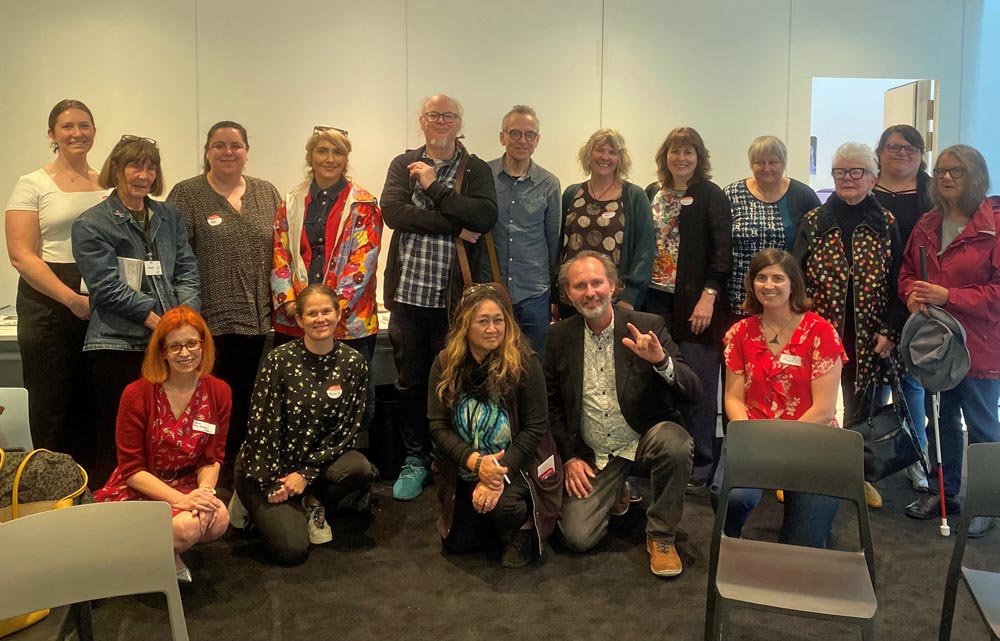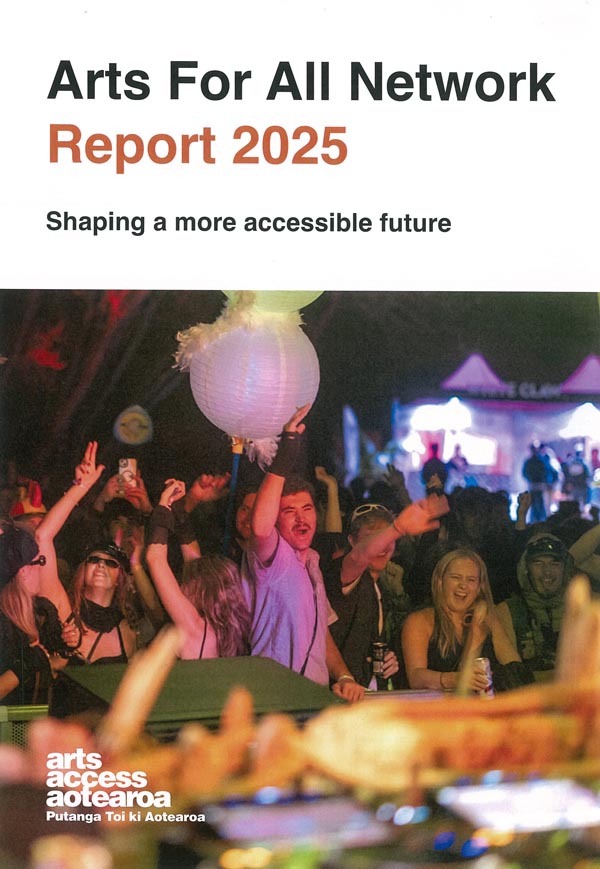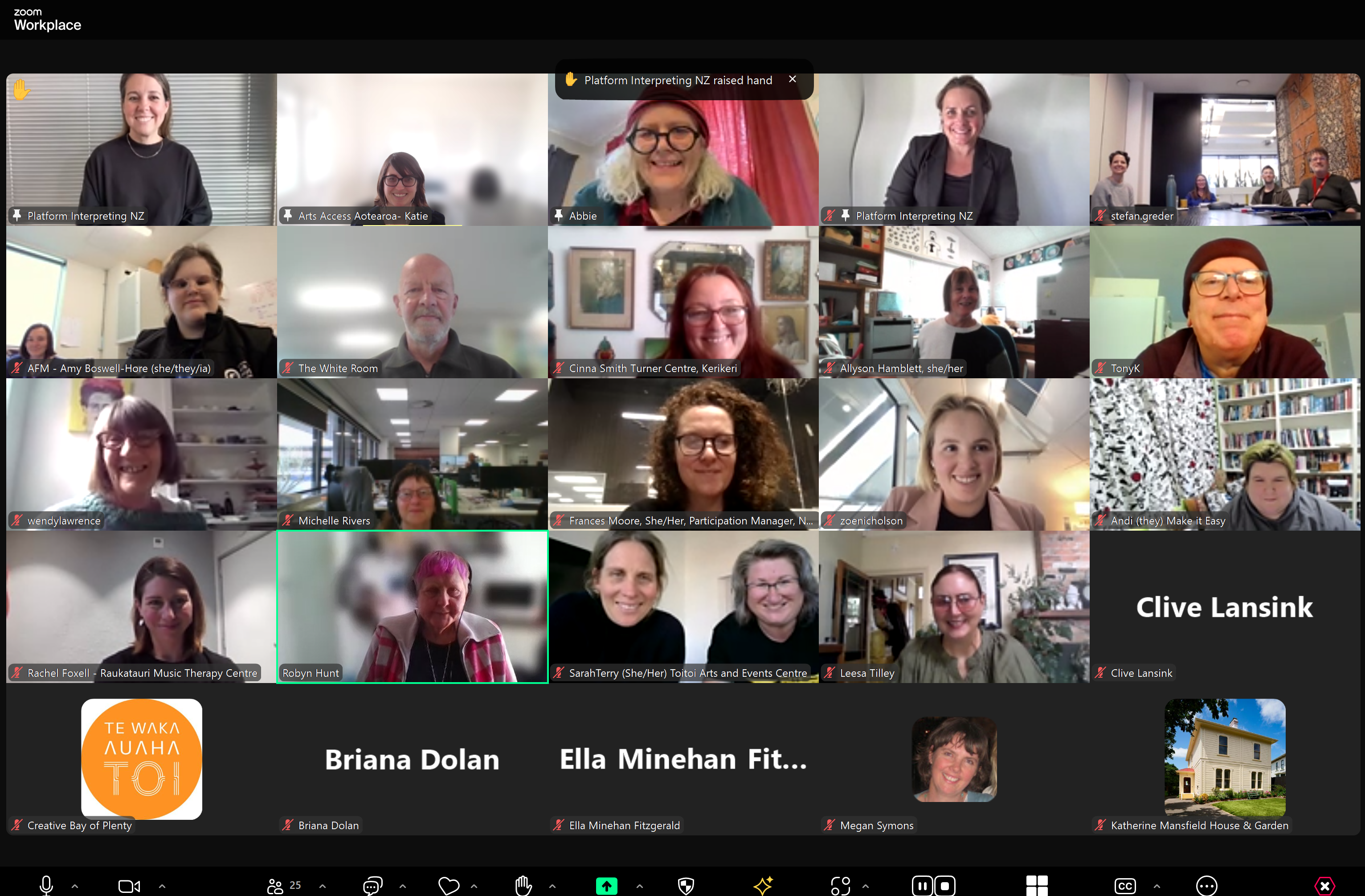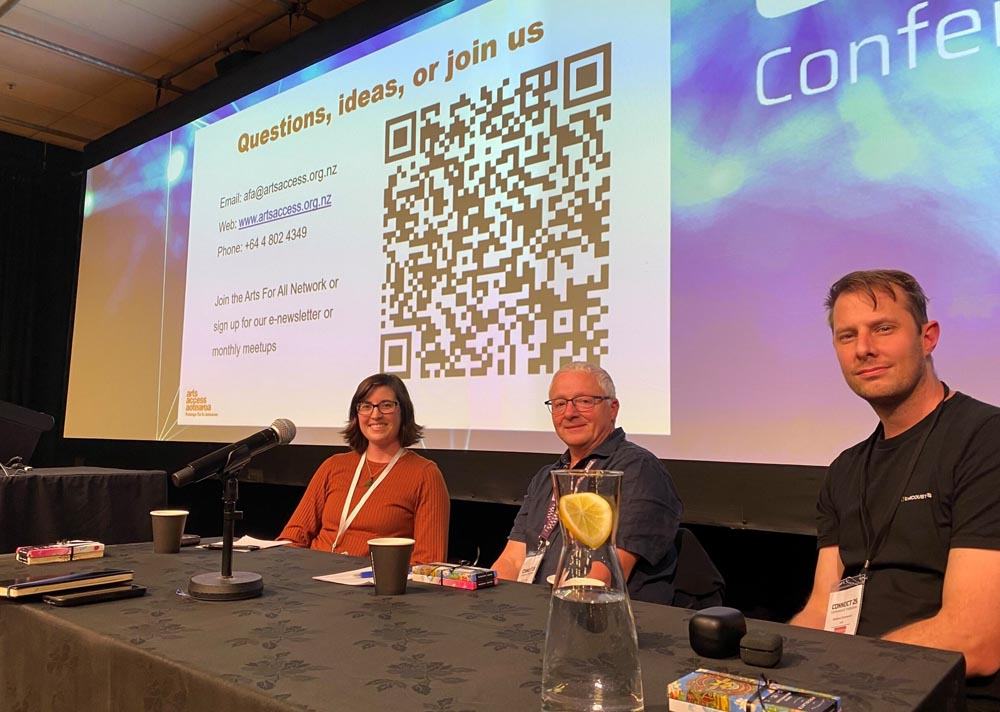The pulse of Aotearoa’s arts community is beating with growing clarity and shared purpose in 2025. A quiet but determined shift is underway: one that places Deaf and disabled people at the heart of arts participation, creation and leadership.
 And at the centre of this shift is Arts Access Aotearoa, this year marking its 30th anniversary, driven by its vision of a society where everyone in Aotearoa New Zealand has access to the arts..
And at the centre of this shift is Arts Access Aotearoa, this year marking its 30th anniversary, driven by its vision of a society where everyone in Aotearoa New Zealand has access to the arts..
A key programme for Arts Access Aotearoa is the Arts For All Network, a national, disabled-led network of individuals and organisations committed to increasing arts accessibility for artists and audiences. The Network connects passionate Deaf, disabled and non-disabled creatives, arts lovers and arts workers with resources, advice and each other to build a more equitable arts sector.
The scope of the Network is broad, and includes arts organisations like theatres, galleries and museums; accessibility service organisations; local and national government representatives; and anyone working in or connected to arts and culture in Aotearoa.
Survey designed to capture members' voices
In late 2024, we conducted a survey of our Arts For All Network members. It was designed to capture the voices of our members - artists, organisations and advocates from across the country - so their experiences, challenges and successes can directly shape the future of our mahi.
 By sharing honest feedback, members help us understand what’s working, where the gaps are, and how we can best support each other moving forward. This survey is not just a data collection exercise; it's a platform for members to influence the Network’s strategic direction, and a vital tool for understanding how our collective work is progressing toward a more accessible arts sector here in Aotearoa.
By sharing honest feedback, members help us understand what’s working, where the gaps are, and how we can best support each other moving forward. This survey is not just a data collection exercise; it's a platform for members to influence the Network’s strategic direction, and a vital tool for understanding how our collective work is progressing toward a more accessible arts sector here in Aotearoa.
Download the Word Document version
Download the Easy Read reports:
Easy Read Arts For All Network survey report (pdf)
Easy Read Arts For All Network survey report (Word)
It’s particularly significant as Arts Access Aotearoa reflects on its 30 years -celebrating the progress we’ve made together and recommitting to the work ahead, grounded in the real stories and needs of the communities we serve.
The insights in this report help ensure the next phase of accessibility work is driven by people, purpose and partnership.
The stories behind the report are powerful. One organisation proudly describes offering relaxed performances for the first time; another reflects on embedding Easy Read materials and NZSL videos into everyday practice. Others talk about building leadership for disabled people or transforming old venues into more accessible spaces, one ramp or sign at a time.
While the survey captured just a slice of the Network's 1,000+ membership, these aren’t isolated successes. They’re signs of a sector evolving, slowly but steadily, toward equity. Almost half of respondents identify as Deaf or disabled themselves, highlighting the steady push toward creating with rather creating for, in our disability-led, partnership-driven Network.
Progress not without pressure
However, progress is not without pressure.
While 63% of respondents said they worked with Deaf or disabled artists in 2024, and 54% delivered accessible events, more than 60% also named lack of funding as a key barrier.
Many respondents operate with small teams or volunteers. Some struggle to secure interpreters and retrofit buildings, or find accessibility competing with other priorities.
For many, the biggest hurdle is a fear of “getting it wrong” or not knowing where to start. All the survey respondents said they want accessibility to be a priority but some didn’t feel equipped to act or know what to do next.
And yet, many are finding ways to act regardless.
Accessibility doesn’t have to start big or be perfect
What’s emerging is a mindset shift: that accessibility doesn’t have to start big or be perfect. It just has to start. From clearer signage to more inclusive language, small changes are building confidence and creating momentum.
 According to the 2025 report, 70% of respondents now have, or are developing, an accessibility policy – a significant leap that points to growing commitment across the sector.
According to the 2025 report, 70% of respondents now have, or are developing, an accessibility policy – a significant leap that points to growing commitment across the sector.
To meet this shift, Arts Access Aotearoa is evolving too. In mid-2024, we launched online monthly meetups for Arts For All Network members, creating new opportunities for regional engagement and knowledge-sharing across distances.
These hui allow members to learn from each other’s challenges and breakthroughs, building a network of support.
Accessibility Responsiveness Training programme set to launch
Meanwhile, a pilot programme of Accessibility Responsiveness Training (ART), funded by Manatū Taonga and co-designed with Deaf and disabled people, wrapped ups its two-year development phase and is set to launch in November. The training provides an arts sector-specific context for accessibility training that can increase knowledge across organisations and teams.
Arts Access Aotearoa continues advocating for stronger laws and policies that centre accessibility. This includes meeting with ministers, advising on national strategies, and preparing a forthcoming advocacy report that makes the case for sustained funding—not just one-off project support.
The Network is building a movement, not just checking boxes. That means shifting culture, not just adding services. And it’s this long-term vision of a barrier-free arts sector, designed by and with Deaf and disabled people, that drives the work forward.
In theatres, libraries, museums, local councils and rehearsal rooms, the seeds of long-term change are growing. As the survey reminds us, accessibility isn’t about perfection: it’s about persistence. And all across the Arts For All Network, that persistence is making a difference.
For more information and to join the Arts For All Network, please call or email Katie Querin (Phone: 04 802 4349 Email: afa@artsaccess.org.nz).
LATEST POSTS
- Arts in Corrections stands on strong ground
- Arts For All Network celebrates 2025
- “Profound ability of toi Māori to create change”
- A love letter to Crip the Lit
- Shift perspectives and improve funding outcomes
- How to use pūrākau in Arts in Corrections
- The light bulbs that art turns on
- Telling your story to “persuadables”
- Art as rehabilitation: the case for creativity in prisons
- Arts For All Network on the road



